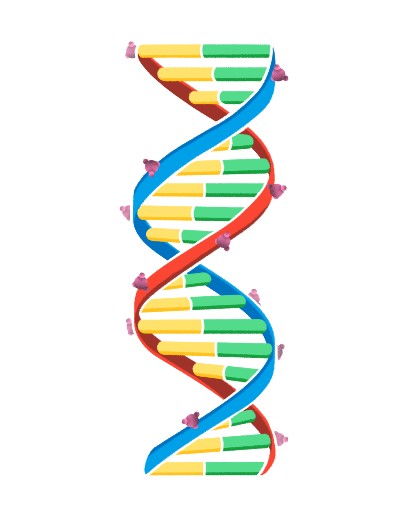Beyond the buzz
Epigenetics clarifies the good, bad, and the ugly of cannabidiol — and countless other drivers for health.

Epigenetics clarifies the good, bad, and the ugly of cannabidiol — and countless other drivers for health.
How does taking cannabidiol (CBD), the main ingredient in marijuana that does not produce any psychoactive effects, during pregnancy affect offspring? The answer, according to Nicole Wanner, DVM, PhD candidate, is more complex than meets the eye. She and her mentor, Christopher Faulk, PhD, recently published a paper on the very topic—and the media ran away with it.
“Cannabis is kind of a both-and situation—it can have both positive and negative qualities,” Wanner says. “People can understand that with things like Tylenol, a drug can help you in some contexts but can hurt you at certain doses.”
But for some reason, we all seem to crave a hard answer on CBD, perhaps because of its relationship to cannabis. Is it good for us or bad? And what happens when the answer can’t be boiled down to such simplicity?
While scientists have studied the effects of tetrahydrocannabinol (THC), the psychoactive ingredient in marijuana that gives users a “high”, Wanner and Faulk’s study was among the first to examine the effects that maternal CBD exposure during pregnancy had on offspring in mammals. In their study, Wanner and Faulk used a mouse model to investigate the impact of CBD use during fetal development and uncovered effects on the brain and behavior. They found that CBD use during pregnancy may affect mood and cognition in offspring that were the mouse equivalent of a 25-year-old adult person.
But the results weren’t all good or all bad. According to the researchers, chronic maternal CBD treatment increased anxiety among the offspring later in life, but it also improved memory performance, particularly in adult female offspring. Further, the effects of CBD during pregnancy persisted even though the offspring had no direct exposure as adults—CBD undoubtedly left its mark.
In the study, maternal CBD treatment shifted gene regulatory marks (a process known by scientists as “DNA methylation”) in hundreds of genes in the brains of adult female offspring. This wider phenomenon, often called epigenetics, is the focus of Wanner’s PhD. Epigenetic marks can change due to various environmental causes other than prolonged CBD use and are involved in many different diseases in mammals, such as osteoarthritis, Alzheimer’s or related dementias, and epilepsy. Wanner has also researched DNA methylation in the context of fish exposed to pollution in their ecosystems.
Wanner describes epigenetics with a metaphor: every cell in your body contains the same instruction manual, but not every cell uses all of that information. “Epigenetics is like italicizing or adding punctuation to a sentence written in the DNA; it can change the meaning and the physical outcome we see, even though the body is using the same book of genes every time,” she says, noting that epigenetics is another level on top of the DNA that regulates health. “It changes the instructions, changes the volume on things, in a way that is critically important for a variety of diseases,” she says. For example, a lung cell and a neuron have the same DNA, but epigenetics is a large part of why those cells do different things and have varied capabilities.
In Wanner and Faulk’s recent CBD study, though, the genes affected by CBD were involved in the formation of new neurons and synapses, communication between neurons, and diseases like autism spectrum disorder, epilepsy, and substance use disorder. These mixed behavioral outcomes, Wanner says, indicate a steep learning curve in this area of research—CBD’s various negative and positive effects on DNA methylation mean that scientists should spend more time, energy, and resources on pinning down exactly when CBD is good, and when it’s bad.
Plus, the early stages of life are a critical time for brain development and the setting of epigenetic marks. So, something like CBD can cause problems during that fragile time.
“Other scientists have already seen this effect with THC, for example,” Wanner says. “Cannabinoids like THC and CBD are active in the brain through multiple mechanisms. The timing of exposure seems to matter a great deal in whether that effect helps or hurts.”
Cannabinoids like THC and CBD are active in the brain through multiple mechanisms. The timing of exposure seems to matter a great deal in whether that effect helps or hurts.
Nicole Wanner, DVM
This study’s findings also echoed something for Wanner that she has long been passionate about: epigenetics have a place in veterinary medicine.
“Epigenetics have taken off in the context of human health,” Wanner says. “But it has taken more time for it to percolate into veterinary medicine. The main veterinary applications of epigenetics that I know of include cancer research and some production-animal–related studies.”
Wanner is helping epigenetics branch out into new areas of veterinary medicine by working with Peter Larsen, PhD, assistant professor in the Department of Veterinary and Biological Sciences at the CVM, and Luciano Caixeta, PhD, assistant professor in the Department of Veterinary Population Medicine. The team is exploring the potential relationship between cattle shipment, epigenetics, and animal stress.

Wanner is excited by the fact that researching CBD can impact the health of pets, food animals, and humans alike. It’s why, she says, she is uniquely positioned as a researcher with a DVM to help better bring this research into the veterinary fold. She first got excited about it while helping the Equine Genetics Lab at the University of Minnesota College of Veterinary Medicine (CVM) with research. “At the time, I thought, ‘Oh wow, this is huge! And I see very little of that in veterinary medicine,’” Wanner says. “In the future, I would love to study epigenetics related to human health while also forming collaborations to make this mechanism more valuable in veterinary medicine.”
The efforts of Wanner and other researchers continue to reveal more about epigenetics’ role as a fine tuner for the information contained in DNA and the impact it has on mammal health.
“There has been a lot of research about specific mutations in specific genes that lead to disease, and then you’re able to develop a therapy for those health problems,” she says. “These studies have made enormous discoveries and improved lives. But a lot of diseases don’t work that way—they have multiple processes going wrong all at the same time.”
Unraveling those mysteries will be a long-term undertaking for researchers in veterinary and human medicine, but with people like Wanner pulling the strings, new routes to health are well on the way for mammals everywhere.
If you are interested in supporting the essential research of our accomplished graduate students, such as Nicole Wanner's, consider giving today!
You can also contact Mindy Means, development officer at the College of Veterinary Medicine, at mkmeans@umn.edu or 612-626-5482.